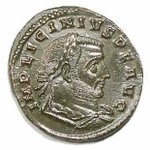
Battle of Mardia(Battle of Campus Ardiensis or Campus Mardiensis) |
year: 316late 316 |
| A non-decisive victory of Constantine over the army of Licinius | ★ ★ ★ ★ ★ |
|
enemy: Romans (Civil War)
|
location: At the basin of Arda River, Greece (or Harmanli, Bulgaria)
|
accuracy:
●●●●●
|
|
battle type: Pitched Battle |
war: Civil Wars of the Tetrarchy (306-324 AD) |
modern country:
Greece |
| ▼ The Byzantines(emperor: Tetrarchy) | ▼ The Enemies | |
| Commander: | Constantine I the Great | Licinius, Augustus of the East |
| Forces: | Unknown | Unknown |
| Losses: |
| Background story: |
| Open civil war between Constantine and Licinius broke in 314 (or 316) when the former invaded Licinius' Balkan provinces. After his crushing defeat at the Battle of Cibalae on October 8, 316, Licinius fled to Sirmium then further south to Adrianople where he collected a second army, under the command of an officer named Valerius Valens whom he raised to the rank of Augustus. At the same time, he tried to negotiate with Constantine but the latter, insulted by the elevation of Valens and confident from his recent victory, rejected the peace offer. |
The Battle: |
 Bust of Licinius The two armies met in the basin of Ardas river in modern Greece or Bulgaria. In the ensuing fierce battle, both sides inflicted heavy injuries on each other until darkness interrupted the indecisive struggle. During the night, Licinius managed to keep his army from disintegration and retreated north-west towards Beroe/Augusta Traiana. Thus, Constantine was again victorious but not decisively. |
Aftermath: |
| As a result, a peace-treaty was signed at Serdica (now, Sofia) on 1 March 317. Licinius recognized Constantine as his superior and ceded to him all European territories except Thrace. The peace lasted 7 years. |
|
|
